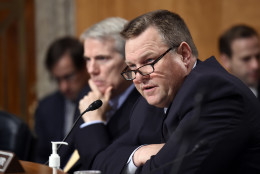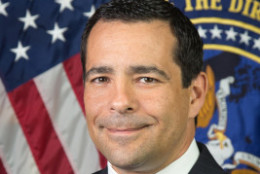National Background Investigations Bureau
-
The House Oversight and Government Reform Committee will consider a series of bills this week that could impact the federal workforce. Among them is legislation that would give participants more options to withdraw investments from the Thrift Savings Plan.
July 17, 2017 -
Current and former counterintelligence officials say there is no known evidence so far that a victim of the Office of Personnel Management's cyber breaches has been specifically targeted. Instead, the public's loss of trust in OPM and government as a whole has been the biggest damage done after the breaches.
April 11, 2017 -
The Office of Personnel Management’s National Background Investigations Bureau (NBIB) awarded a contractor for support services in January, but now is facing complaints from two unsuccessful bidders.
February 27, 2017 -
Sens. Claire McCaskill (D-Mo.), ranking member of the Homeland Security and Governmental Affairs Committee, and John Tester (D-Mont.) wrote to Comptroller General Gene Dodaro on Feb. 6 asking for an analysis of what went right and what went wrong when DoD moved to the Office of Personnel Management’s Federal Investigative Service (FIS) nearly 12 years ago.
February 07, 2017 -
IT leaders at the Office of Personnel Management say the agency has one major database left to encrypt, which contains some high-value assets and personally identifiable information for security clearance holders and federal employees.
February 02, 2017 -
Bill Evanina, the director of the National Counterintelligence and Security Center and the National Counterintelligence Executive, said the lead agencies reforming the security clearance process made subtle, but important changes to how investigators check employees’ backgrounds.
February 01, 2017 -
Dan Chenok, the executive director of the IBM Center for The Business of Government, highlights seven key takeaways from a recent roundtable on improving the background investigations processes.
February 01, 2017 -
President Barack Obama signed an executive order Jan. 17, which sets the governance process and suitability standards for agencies and the population of federal employees and contractors. It clarifies the work that the Office of Personnel Management and National Background Investigation Bureau has already started to develop a more modern vetting system.
January 17, 2017 -
The Office of Personnel Management says it's spent the past eight years working within the confines of current laws and regulations to modernize the federal personnel system and help agencies better recruit, hire and retain talented employees. But as the Obama administration winds down, OPM suggested that future administrations should more seriously discuss reform to those civil service regulations.
January 05, 2017 -
From a massive January snowstorm to a pay raise for all federal employees, we look back at the stories that meant the most to our readers in 2016.
December 30, 2016 -
Federal employees and contractors waited hundreds of days in some cases for a security clearance in 2016, but the Office of Personnel Management spent much of the year putting the policy pieces in place for improvement. Key stakeholders in the Performance Accountability Council developed an IT plan for the new background investigation system and issued business rules for adjudicating some cases.
December 27, 2016 -
President-elect Donald Trump's suggested hiring freeze on the federal workforce could have major implications for federal contractors. With possible plans to cut the size of the federal workforce through attrition and retirements, some contractors say industry may have to shoulder more of the workload, since the capability requirements won't change even as government shrinks.
November 22, 2016 -
Experts say until the government moves to a continuous evaluation program of employees and contractors with clearances, threats from employees will continue to grow.
October 17, 2016 -
The Defense Department issued a RFI to industry outlining 12 functional areas it wants to upgrade using government-owned and commercial technologies.
September 22, 2016 -
The Office of Personnel Management is expected to launch the National Background Investigations Bureau (NBIB) on Oct. 1 with eight new functions.
September 19, 2016















